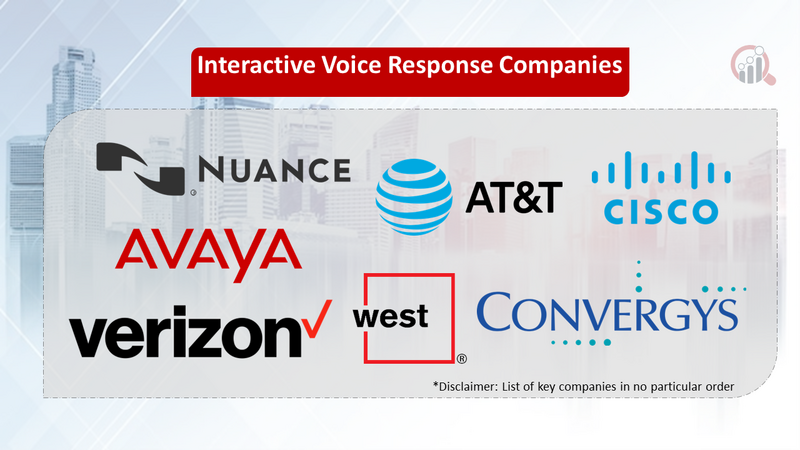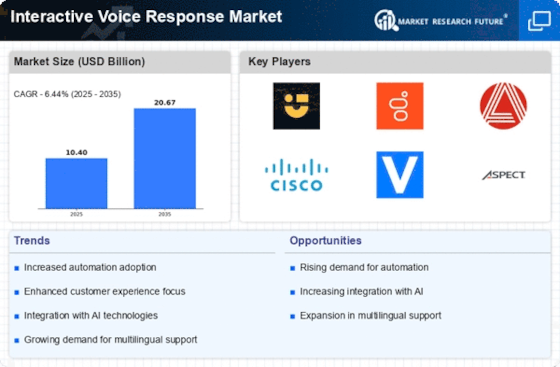Top Industry Leaders in the Interactive Voice Response Market

The Interactive Voice Response (IVR) Market: A Vocal Arena
The Interactive Voice Response (IVR) market is experiencing a seismic shift. Once seen as a means for basic automated phone menus, IVR is evolving into a sophisticated tool for customer engagement, driven by advancements in speech recognition, natural language processing (NLP), and artificial intelligence (AI). This dynamic landscape demands a closer look at the key players, their strategies, and the factors shaping market share.
Key Players:
- Nuance Communications Inc. (U.S.)
- Convergys Corporation (U.S.)
- Avaya Inc. (U.S.)
- Cisco Systems Inc. (U.S.)
- AT&T Inc. (U.S.)
- West Corporation (U.S.)
- Genesys Telecommunication Laboratories Inc. (U.S.)
- Verizon Communications Inc. (U.S.)
- IVR Lab (U.S.)
Strategies Adopted:
-
AI-Powered Innovation: Players are integrating AI capabilities like sentiment analysis, voice biometrics, and conversational AI to personalize customer interactions and improve self-service resolution rates. -
Omnichannel Integration: Beyond phone channels, integrating IVR with chatbots, social media messaging, and web interfaces creates a seamless omnichannel experience for customers. -
Analytics and Reporting: Advanced analytics dashboards provide insights into customer behavior, allowing companies to optimize IVR workflows and identify areas for improvement. -
Security and Compliance: With stricter data privacy regulations, robust security features and compliance adherence are crucial for building trust with customers.
Factors for Market Share Analysis:
-
Technology Advancement: Companies with cutting-edge AI and NLP capabilities will have an edge in capturing market share. -
Industry Focus: Specialization in specific industries allows for tailored solutions and deeper customer relationships. -
Cloud Deployment: Flexibility, scalability, and cost-effectiveness of cloud-based IVR solutions drive market adoption. -
Partnerships and Acquisitions: Strategic partnerships and acquisitions expand reach, acquire new technologies, and access niche markets.
New and Emerging Companies:
-
Voice Biometrics Startups: Voiceprint, iNVoq, NuData: These companies offer voice-based authentication solutions, enhancing IVR security and user experience. -
Conversational AI Developers: Ada, SemanticBots, Rasa: Building innovative AI chatbots and virtual assistants, these companies offer alternatives or integrations with IVR systems. -
Independent Software Vendors (ISVs): Small, agile companies providing specialized IVR modules for specific tasks like appointment scheduling or lead generation.
Current Company Investment Trends:
-
Cloud Migration: Major players are investing heavily in cloud-based IVR platforms to cater to growing demand for flexible and scalable solutions. -
AI Integration: Investments in AI research and development are accelerating to enhance speech recognition, NLP, and self-service capabilities. -
Analytics and Reporting: Companies are building advanced analytics platforms to provide deeper customer insights and optimize IVR performance. -
Strategic Partnerships: Collaborations with cloud providers, technology vendors, and industry experts are fostering innovation and market expansion.
The IVR market is in a state of flux, with disruptive technologies and new players challenging established giants. Understanding the competitive landscape, key strategies, and investment trends is crucial for companies to navigate this dynamic space and capitalize on the immense potential of IVR for improved customer engagement and business outcomes.
Latest Company Updates:
Nuance Communications, December 2023
-
Acquisition: Nuance Communications acquires Saylent Technologies, a leading provider of cloud-based IVR solutions, to expand its portfolio and reach.
Microsoft, November 2023
-
Partnership: Microsoft and Avaya partner to integrate Microsoft Azure AI services with Avaya's IVR platform for enhanced customer engagement capabilities.
Aspect Software, October 2023
-
Regulations: The General Data Protection Regulation (GDPR) and other privacy regulations are prompting IVR providers to implement stricter data security measures.










